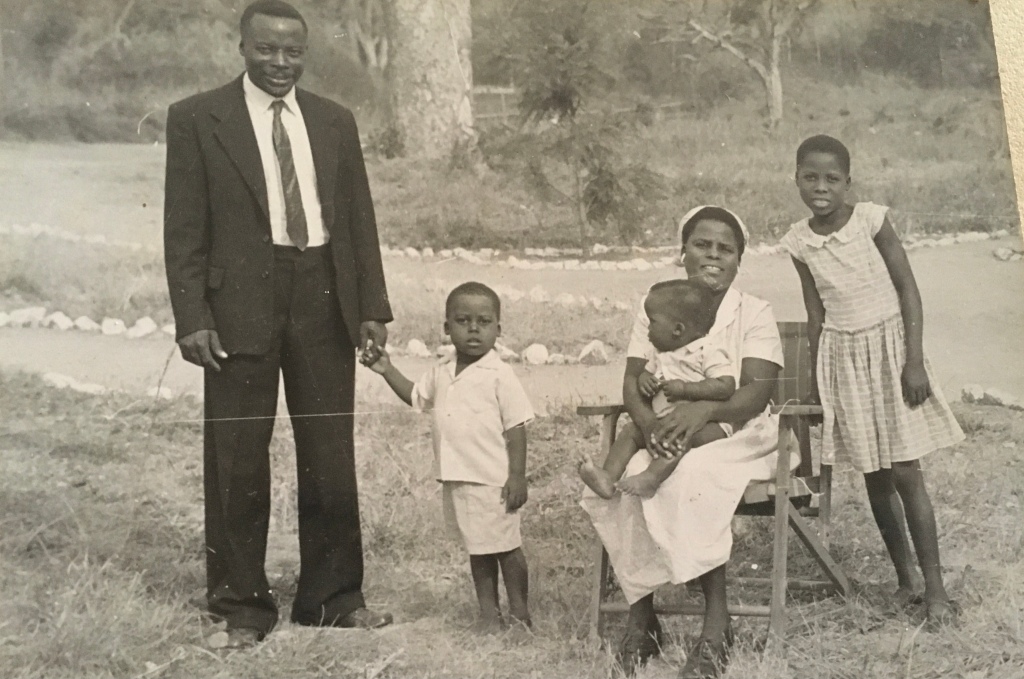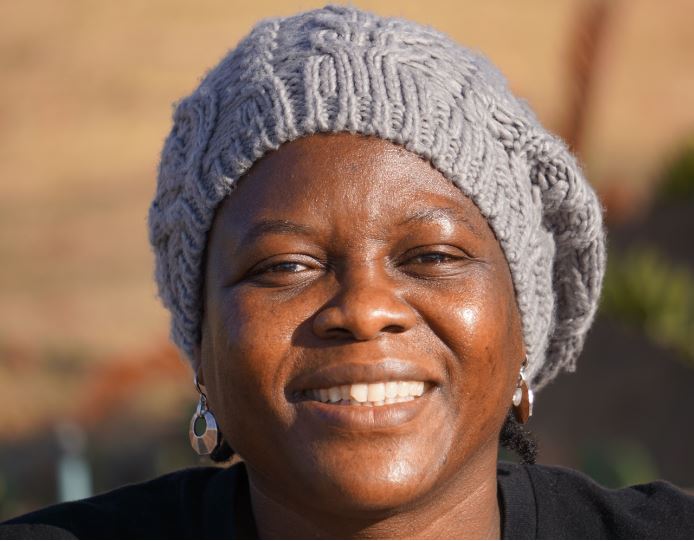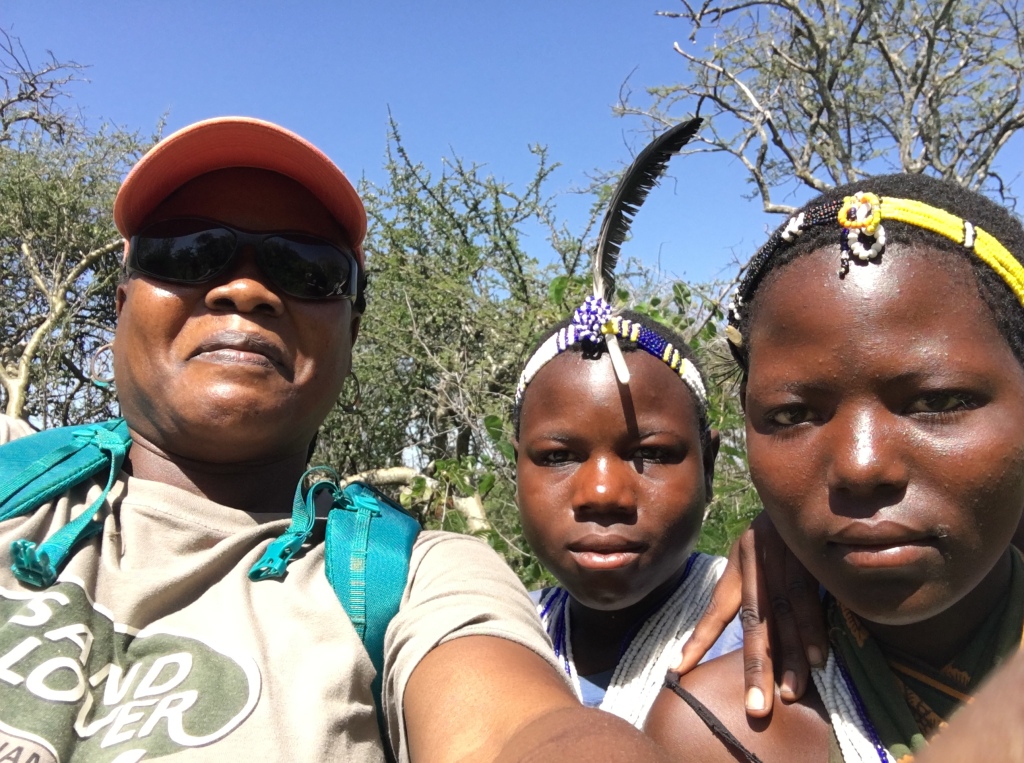‘We need to codesign programs that move away from disempowering communities and indigenous people to giving them the power to be strong stewards of the natural resources and the lands,’ says Dr Patricia Mupeta-Muyamwa, Strategy Director for the African Indigenous Landscape program at The Nature Conservancy, a charitable environmental organisation with its base in the US.
Her job involves working with local communities to protect and nurture the natural environment. Patricia says she fell into the work more by accident than design.
‘I did my undergraduate degree in wildlife ecology at the University of Zambia in Lusaka, and in my last six months did an internship monitoring wildlife and vegetation in a national park. The job involved interacting with the park scouts, and after listening to their experiences I realised that it was people and not wildlife that was the problem, and I asked myself how do we empower people to make them better stewards of nature?
‘I did my Masters in conservation and tourism in the UK, and learned about different models of conservation. Because of the chequered history between national park administration and local communities, which left a great deal of animosity towards the state, my work promotes the importance of getting the rights to land and natural resources to the people that live closest to them.
‘Historically, African national parks and nature reserves were created for aesthetic reasons using an American model first developed for Yellowstone National Park.
‘Up until the 1990s, the state and not the local people ran national parks and conservation areas; it was a relic of Africa’s colonial past, and part of my work is to help address this injustice by reconciling local people so they’re a part of the conservation solution.
‘Local communities were forced out. People were seen as part of the conservation problem and not as part of the solution. For example, in South Africa national parks are still state run in a very centralised way; there are many communities around Kruger but few are getting any real benefit from it except a few people that find employment.’
Patricia says her long job title came from her work as it evolved.
‘A large part of the job is focused on protecting wildlife corridors spanning across parks, private and community-owned lands.
‘The work itself has three main objectives. First, giving land and resource rights back to the local community. Second, developing community skills to manage natural resources for example protecting and monitoring wildlife . Third, helping develop community opportunities for making a living from conservation, for example with tourism and programs that empower women.’
Patricia stresses this is a bottom-up approach. ‘A big part of my job is to consult with communities and their leaders to find the best conversation solution. I listen to their stories about living and interacting with the land.’
Patricia leads teams that are managing four big landscape projects, one in Kenya involving 39 separate communities, two in Tanzania and one in Zambia.
‘We’ll soon be starting a fifth one in Angola, based around the headwaters of the Okavango River.’
As an example of what these projects can achieve, Patricia cites the work done with a local partner Northern Rangelands Trust with 39 separate communities.
‘Establishing wildlife corridors between these communities has been successful in increasing numbers of previously threatened animals such as elephants.
#
Patricia was born and raised in Kitwe, a mining town in Zambia’s Copper Belt on the Kafue River, Zambia’s third largest river. This is also where she first met her husband Andrew, now a Maths Studies high school teacher. The two of them have fond memories of growing up in this small, quaint mining town.
‘My parents worked for a mining conglomerate. My father worked for 27 years as a human resources manager for a copper mining company. He was a real people person, and connected with people from all walks of life.
‘My mother was a teacher, training first in Zambia to teach home economics, but later she studied in Liverpool in the UK to become a Montessori teacher; and was the first Zambian to achieve this.’
Patricia grew up in a one-party state created by independent Zambia’s first president, Kenneth Kaunda. Following a period of instability, the 1973 signing of the Choma Declaration banned all parties except Kaunda’s own, the United National Independence Party (UNIP). He remained in power until he was ousted after being forced to hold multi-party elections in 1991.
‘Kitwe’s British-South African owned mining company was nationalised by the Zambian government, so I grew up thinking it was normal to grow up in a black-run black society. It was a source of pride for us that Zambians were in charge of the company.’
Patricia says that even though she grew up in a one-party state, she only became aware of that as she finished high school.
‘But living in it as a child you don’t necessarily feel authoritarian measures, for example restricted access to the world outside Zambia. We were cocooned, but that didn’t feel bad. In some ways I would rather live in that state than what exists now. Things worked: there was infrastructure that worked, equity for all seventy-two tribes and a sense of security. I believe Kenneth Kaunda was motivated for the greater good of society. He created an environment that allowed everyone to have access to healthcare, education and employment regardless of background.
‘Kaunda created a system where we didn’t feel black, but Zambian. My father’s generation, which grew up under colonial rule in what was then Northern Rhodesia, was taught British, European and American history at school; my generation was taught pre- and post-colonial African history.
‘Kaunda led the way in institutionalising a Zambian identity. As a kid I didn’t really appreciate the gravity of this, but looking back now I see that it helped me navigate through life as a Zambian. Kaunda called this philosophy “humanism” – in the sense that the core values were about recognising our common humanity, and that we should always be aware that history was judging us and so be peaceful, respectful and good to each other.’
But things started to change in the late 1980s and early 1990s.
‘The economy was stalling and there were food shortages. Up to then the majority of Zambians had been politically passive; there wasn’t a lot of collective activism. The system that existed helped make it that way. But at that point the multi-party democracy movement challenging Kaunda was slowly taken up by the people.
‘When I was sixteen I was apolitical, but then my dad took me and my older brother to my first political rally just before Kaunda left. It wasn’t simply an anti-Kaunda rally, but more about a wind of change. It was huge and exciting – there was a great desire for change – and when it came I was hopeful. Everything felt new and that at last we were going places and fighting for a better Zambia. There was a sense of entrepreneurship in the early 90s, and new markets were opening up. The mines were privatised, for example, and different assets were being sold, like the mining homes, and many Zambians became home owners for the first time.
‘But in the euphoria we forgot what Kaunda had done for Zambia. The current political system in Zambia is not as effective as the old political system. There is less equity and less access to health, work and education. The Zambian economy is on life support.’
#

The one great source of stability for Patricia is her family.
‘I come from a very strong nuclear family, which is not the norm for families in Africa. It is a central part of who I am. My husband, parents, siblings and my maternal grandmother have all influenced my life in different aspects.’
Patricia says her grandmother, Dorika, was independent, strong-minded, political and entrepreneurial. Born in the early 1920’s, she witnessed her country move from a colonial to a post-colonial era.
‘She was a Kaunda supporter and freedom fighter from the colonial era. She later became a strong organizer in the women’s league of the United National Independent Party (UNIP).
‘Towards the end of the colonial period she accompanied her husband, a community development officer, to different postings all over the country. In one posting he was sent to a district in the northwest at the same time as the colonial authorities imprisoned Kaunda there; when Dorika saw Kaunda being taken for his daily walk she would go up and talk with him, much to the distress of the local British officials. During one encounter she was reprimanded by the District Governor for this action. She held her ground, and continued with her actions. This upset the Governor and he later transferred my grandfather away from the district because of his “troublesome wife”.
‘During the time when there was a call for change from Kaunda’s rule, she said “No! No change!”’

After her husband died, Dorika supported her family of eight children by selling bread and other baked goods from home and at the market.
‘With two other women she set up one of the first female trading markets in Kabwe, a small mining town in central Zambia; it’s still operating to this day.’
Patricia says she drew a great deal from her grandmother.
‘I admired the way she navigated through life and survived as a woman and as a leader. She did so much in her life and in her own way. The older she got the stronger she got, and she was a great female model. She really lived life in her own terms.’
Patricia’s father, David, was the biggest male influence on her life. ‘My love of reading came from him. I loved going into his library. I read his 12-volume encyclopedias over and over.’
Patricia says growing up she never gave her mother the same attention she gave her father.
‘I was a “daddy’s girl”, and she wasn’t in my “cool space” back then. Now I realise just how similar we were. She was a trail-blazer. She was the first Zambian to study and teach Montessori; that took a lot of initiative and courage.’
Perhaps the biggest influence her mother had on her life was her decision to send Patricia and her sister, Edith, to an all-female boarding school run by German nuns; one of the oldest and best schools from its establishment in the early 1900s. She remembers the school was run under a very strict regime.
‘I did not like it at all. The nuns worked us very hard. When I tell people I went there they ask me if my parents hated me! But in hindsight, the education I gained from that time was invaluable.’
#
Patricia says she wasn’t really conscious of her skin colour until she travelled to the UK and, especially, the US, for study.
‘I’m not sure whether or not that was a peculiarly Zambian experience. I’ve heard very different stories about encounters with racism from other black people, many of them heartbreaking.
‘Up to then I never thought of myself as a “black” person. My first racist encounter was in the UK when I was in my early 30s, when a hobo at a train station yelled at me to go “home”. I was shocked more than hurt by it because for the first time I became truly aware that this society was different from the one I grew up in.’
She says that while studying for her masters at the University of Kent she felt she was living in a bit of a bubble because she was very familiar with the British tradition and culture that had been such a part of Zambia before independence.
‘Growing up in Kitwe I had many encounters with non-racist and progressive Brits. It wasn’t until I was studying in the US that racism really hit me.
‘Soon after I arrived at the town where I was going to study I started looking for accommodation and came across a poor black neighbourhood. I began to understand how a community placed like this, separated from better-off communities, institutionalised racism.
‘US culture was strange and interesting. I was living in a diverse and liberal university town in northern Florida, but you didn’t have to drive far from the town to find Confederate flags flying in front yards. It was a totally different society.
‘For the first time I felt and identified as “black”. I found myself gravitating towards black student unions and organisations helping black communities.’
Patricia was saddened to see great poverty in some black communities in the US. ‘I had seen poverty in Africa, of course, but here it was like the lights had gone out. There was a lot of hurt and anger in that tribe – a tribe I can relate to – but the hurt and anger also existed in the academic environment which was so different from my previous experience it threw me off guard somewhat.
‘What I also found interesting was the way the black community was divided among African Americans, Caribbeans and Africans. It could be hard to cross the divide, but I’m not sure how much that was due to my own naivety. The black student union had a good ethos, for example, but it’s leadership was African American, and they defined the union’s agenda and this is where a lot of the union’s energy was spent. I had to think about what it meant to be an African in this situation. My initial enthusiasm at being part of the union started to wane because I couldn’t see what my role might be.’
#
Patricia says she identifies as Zambian but feels African.
‘I especially feel broadly connected to sub-Saharan Africa. African countries like Zambia, Kenya, Botswana and South Africa have more in common than not.

‘There is a connection around tradition, culture and how we think about family. There is a very strong “oneness” around family events that goes with a sense of community. This means there is still an especially strong tie in many countries between urban and rural communities; people working in the big cities still go back to their families living in rural areas for important occasions.’
Patricia hopes those values will see sub-Saharan Africa through to a better future. ‘Right now, for example, that rural link for urban dwellers means many of them have a comparatively safe refuge during the current COVID-19 pandemic.
‘Strangely, this isn’t what’s happening in Zambia, where the rush to urbanise seems to have cut many of those ties to the country. I don’t know the village where dad came from, for example.
‘Africa needs to reconnect to its core identity. I believe we lost this connection as we urbanised. My hope is that we will see those links repaired in Zambia and other parts of Africa.’


